#korean linguistics
Text
Seventeen's Dialects
For a very tiny country, South Korea has many distinct dialects (6 major ones to be exact). And so I wanted to share with yall the different dialects used by Seventeen members! (especially seungkwan cuz its so cool)
Gyeongsang Dialect: this dialect is by far the most popularized and well-known Korean dialect. it's mainly characterized by its aggressive, fast-paced, and strongly emphasized sounds. it's also pitch-accented, meaning you can hear the different intonations and stresses on syllables. there are also subtle differences between different gyeongsang-do cities that native speakers of the dialect can easily hear and tell apart.
Woozi - Woozi is from Busan, where the accent falls on the back syllable and the "g" (ㄱ) is used more. his accent doesn't really jump out often but every now and then you can hear a slightttt tinge of the dialect. in BTS Suga's Suchwita episode 10 with Woozi theres a part where Suga (as a fellow gyeongsang-do born) is able to immediately tell that Woozi is from gyeongsang by his intonation.
S.Coups - on the other hand, S.coups is from Daegu, where the accent falls on the front syllable and the "k" (ㅋ) sound is used more. as you can see, even though s.coups and woozi are both from gyeongsang, their different cities means their accents are a bit different. in fact, the busan dialect evolved in order for people to be able to hear what is being said over water better whereas the daegu dialect evolved to be able to travel through the air better. s.coups' accent jumps out quite often in varying degrees. sometimes its very obvious and other times it's more subtle, but overall you can definitely notice it if you listen close enough.
Wonwoo - unlike the other two, wonwoo is from Changwon, so neither Busan or Daegu (the 2 most prominent gyeongsang-do cities). i don't have enough experience to know anything in particular about the changwon dialect but i assume that it's basically the same as the busan dialect since it's pretty close to there. from what I personally hear, I think wonwoo's dialect is definitely the most recognizable and frequent out of the 3 gyeongsang members. i feel like every other sentence he says has a bit of the accent thrown in naturally.
Jeolla Dialect: the jeolla dialect also has many different pitches and intonations used and is mainly characterized by its warm and kind sounding tone. vowels are the emphasis and are dragged out/lengthened, giving speakers of this dialect a very affectionate, smooth, and melodic voice.
Dino - dino likes to whip out his dialect here and there, especially when joking around and having fun with the other members. dino's accent comes out the most by far whenever he turns into his boomer character, Pi Cheolin! so basically any Pi Cheolin clip is just dino speaking in jeolla dialect.
Jeju Dialect (language): this dialect of Korean is so vastly different from the rest of the dialects that it's basically completely unintelligible to other Koreans. because of this, many people even say that the Jeju dialect is actually a language of its own. really, the jeju dialect seems to be officially classified as a "language dialect". to add on, this dialect is also classified as a critically endangered language by UNESCO which is definitely very worrying.
Seungkwan - even though he is from Jeju Island, there has never really been a time where he ever spoke in the Jeju dialect in front of the camera. so unfortunately there's no examples I can give regarding Seungkwan....atleast thats what I thought. after some more digging on the korean side of the internet it turns out there are a few clips of him speaking in the jeju language! heres one of them:
youtube
The rest of the members speak in just the Standard Korean dialect (Gyeonggi) btw
#seventeen#going seventeen#korean language#korean linguistics#koreanlanguage#korean#kpop#seungkwan#svt#boo seungkwan#s.coups#choi seungcheol#svt dino#wonwoo#woozi#svt woozi#lee jihoon#svt bss#bss#dialect#language learning#language#language stuff#linguistics#south korea#busan#daegu#Youtube
40 notes
·
View notes
Text
thoughts about the Cardassian writing system
I've thinking about the Cardassian script as shown on screen and in beta canon and such and like. Is it just me or would it be very difficult to write by hand?? Like.

I traced some of this image for a recent drawing I did and like. The varying line thicknesses?? The little rectangular holes?? It's not at all intuitive to write by hand. Even if you imagine, like, a different writing implement—I suppose a chisel-tip pen would work better—it still seems like it wasn't meant to be handwritten. Which has a few possible explanations.
Like, maybe it's just a fancy font for computers, and handwritten text looks a little different. Times New Roman isn't very easily written by hand either, right? Maybe the line thickness differences are just decorative, and it's totally possible to convey the same orthographic information with the two line thicknesses of a chisel-tip pen, or with no variation in line thickness at all.
A more interesting explanation, though, and the one I thought of first, is that this writing system was never designed to be handwritten. This is a writing system developed in Cardassia's digital age. Maybe the original Cardassian script didn’t digitize well, so they invented a new one specifically for digital use? Like, when they invented coding, they realized that their writing system didn’t work very well for that purpose. I know next to nothing about coding, but I cannot imagine doing it using Chinese characters. So maybe they came up with a new writing system that worked well for that purpose, and when computer use became widespread, they stuck with it.
Or maybe the script was invented for political reasons! Maybe Cardassia was already fairly technologically advanced when the Cardassian Union was formed, and, to reinforce a cohesive national identity, they developed a new standardized national writing system. Like, y'know, the First Emperor of Qin standardizing hanzi when he unified China, or that Korean king inventing hangul. Except that at this point in Cardassian history, all official records were digital and typing was a lot more common than handwriting, so the new script was designed to be typed and not written. Of course, this reform would be slower to reach the more rural parts of Cardassia, and even in a technologically advanced society, there are people who don't have access to that technology. But I imagine the government would be big on infrastructure and education, and would make sure all good Cardassian citizens become literate. And old regional scripts would stop being taught in schools and be phased out of digital use and all the kids would grow up learning the digital script.
Which is good for the totalitarian government! Imagine you can only write digitally. On computers. That the government can monitor. If you, like, write a physical letter and send it to someone, then it's possible for the contents to stay totally private. But if you send an email, it can be very easily intercepted. Especially if the government is controlling which computers can be manufactured and sold, and what software is in widespread use, etc.
AND. Historical documents are now only readable for scholars. Remember that Korean king that invented hangul? Before him, Korea used to use Chinese characters too. And don't get me wrong, hangul is a genius writing system! It fits the Korean language so much better than Chinese characters did! It increased literacy at incredible rates! But by switching writing systems, they broke that historical link. The average literate Chinese person can read texts that are thousands of years old. The average literate Korean person can't. They'd have to specifically study that field, learn a whole new writing system. So with the new generation of Cardassian youths unable to read historical texts, it's much easier for the government to revise history. The primary source documents are in a script that most people can't read. You just trust the translation they teach you in school. In ASIT it's literally a crucial plot point that the Cardassian government revised history! Wouldn't it make it soooo much easier for them if only very few people can actually read the historical accounts of what happened.
I guess I am thinking of this like Chinese characters. Like, all the different Chinese "dialects" being written with hanzi, even though otherwise they could barely be considered the same language. And even non-Sinitic languages that historically adopted hanzi, like Japanese and Korean and Vietnamese. Which worked because hanzi is a logography—it encodes meaning, not sound, so the same word in different languages can be written the same. It didn’t work well! Nowadays, Japanese has made significant modifications and Korean has invented a new writing system entirely and Vietnamese has adapted a different foreign writing system, because while hanzi could write their languages, it didn’t do a very good job at it. But the Cardassian government probably cares more about assimilation and national unity than making things easier for speakers of minority languages. So, Cardassia used to have different cultures with different languages, like the Hebitians, and maybe instead of the Union forcing everyone to start speaking the same language, they just made everyone use the same writing system. Though that does seem less likely than them enforcing a standard language like the Federation does. Maybe they enforce a standard language, and invent the new writing system to increase literacy for people who are newly learning it.
And I can imagine it being a kind of purely digital language for some people? Like if you’re living on a colonized planet lightyears away from Cardassia Prime and you never have to speak Cardassian, but your computer’s interface is in Cardassian and if you go online then everyone there uses Cardassian. Like people irl who participate in the anglophone internet but don’t really use English in person because they don’t live in an anglophone country. Except if English were a logographic writing system that you could use to write your own language. And you can’t handwrite it, if for whatever reason you wanted to. Almost a similar idea to a liturgical language? Like, it’s only used in specific contexts and not really in daily life. In daily life you’d still speak your own language, and maybe even handwrite it when needed. I think old writing systems would survive even closer to the imperial core (does it make sense to call it that?), though the government would discourage it. I imagine there’d be a revival movement after the Fire, not only because of the cultural shift away from the old totalitarian Cardassia, but because people realize the importance of having a written communication system that doesn’t rely on everyone having a padd and electricity and wifi.
#if I read over this again I will inevitably want to change and add things so I'm refraining from doing that. enjoy whatever this is#forgive my very crude recounting of chinese and korean history! I am neither a historian nor a linguist#but I will NOT apologize for talking abt china so much. that's my culture and I'm weird abt it bc of my family history#and it's my GOD GIVEN RIGHT to project what little I know abt it onto all my worldbuilding#also I've never actually read abt any of the various cardassian conlangs but I'm curious if this contradicts or coincides with any of them#I still want to make my own someday. starting college as a linguistics major (in 2 weeks!!) so presumably I will learn how to do that#narcissus's echoes#ds9#asit#star trek#cardassians#cardassian meta#a stitch in time#hebitians
679 notes
·
View notes
Text
Love for Love's Sake | Things You Didn't Notice #4 | Fight with Homophobes
Honestly, I wanted to dissect these scenes right away but then we got the rest of the show uploaded and the emotions overshadowed me. But now we're diving into informal Korean speech, swearing and slurs! It's going to be a fun post, let's go :D
Disclaimer: I'll be writing down both English and Korean slurs strictly in educational manner, obviously.
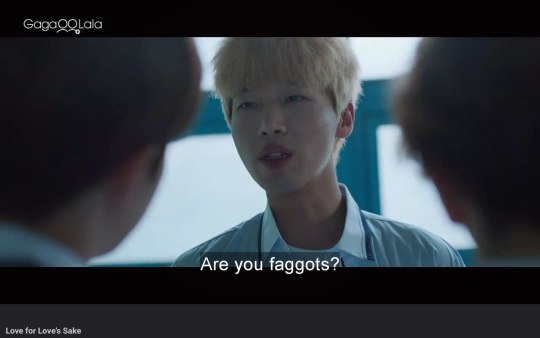
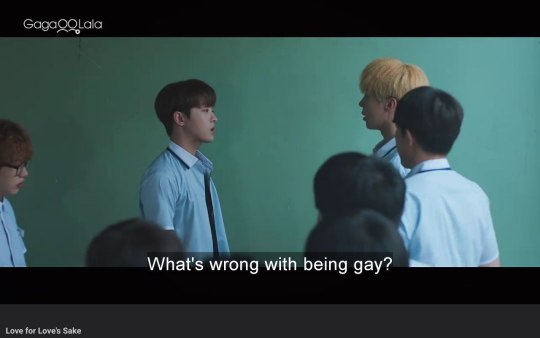
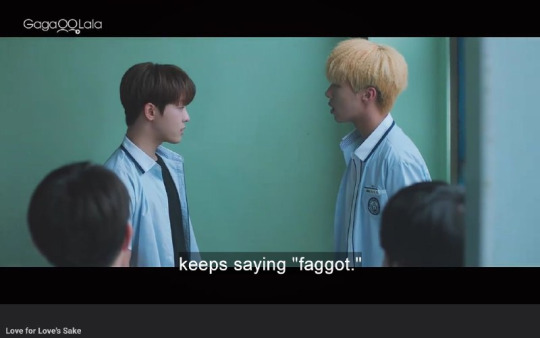

"Fuck. You two are always so fucking close together. (to Myungha) Are you also a faggot (homosekki)? Wow, Kyunghyun's skills are so good."
"Why are you so vulgar? What's wrong with being homo?"
"You're really crazy. Are you criticizing me?"
... (Myungha kisses Tak Junho)
" Ah fu— You damn faggot!"
"We both kissed. I'm not the only one who's homo. You're homo too~"
"You did it yourself, you faggot!"
"Ah, our Junho keeps saying 'homo'. Tss, slurs are forbidden."
"Shut up, you faggot."
"If you call me homo one more time, I can steal your lips for real. (Junho is silent) Ha, afraid you'll be robbed?"
Honestly, I like the translation in subs this time, I just wanted to give you a more technical version (and to show you the difference, because in Gaga subs the f slur is also used by Myungha but it's not exactly that)
So, as far as I noticed, the slur in Korean is a derivative from the term "homosexual" - thanks to the similar sounding, it became "homosekki" (from sekki - asshole, bastard, bitch etc). This is the word Junho keeps using in almost every sentence. And the socially accepted common term is now "gay" (at least, the cast and couple from Korean reality dating show "His Man 2" refers to themselves as 'gay' and not 'homo').
Myungha uses the original term, just "homo", which also gained a negative connotation but doesn't include a 'sekki' swearword. So he keeps saying "homo" to talk back in the language Junho used, only less derogatory. We'll see later but it's amazing, because both Myungha and Sangwon confidently used this word about themselves (Sangwon even went further and proudly reclaimed the slur itself).
Still, Myungha did threaten gangster Junho not to even call him "homo" or any similar terms. And here's the moment which made me laugh: in the next scene with Sangwon, Junho was angry ranting about Myungha, but he caught himself using the slur "homosekki" and quickly changed to the modern and neutral term "gay". LOL
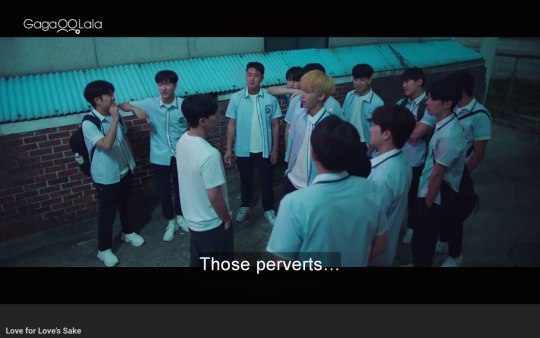
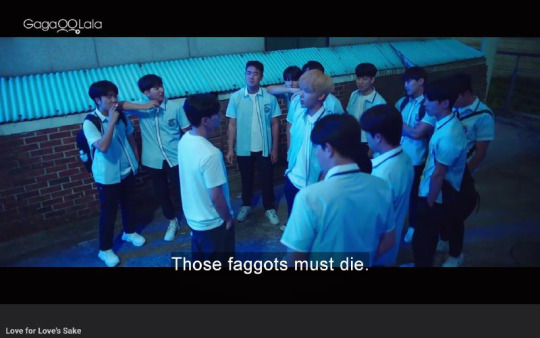


Which is what Gaga subs failed to show it to us. Again, let's see more technical translation:
"I'll go after Tae Myungha and Ahn Kyunghoon soon, just so you know. Those fa– Those gay bastards must die. That fucker Tae Myungha kissed me in the lips, shit. Isn't it fucked up? It was disgusting."
(Sangwon, pouting) "Wow, really? It must've been nice."
"Jeez, you asshole. You're not a victim so you dare talking shit."
"I'm being serious, though?"
(Junho, appalled) "What the hell are you talking about? You're not a faggot."
"I am a faggot, though?"
One, why is it so funny that the first reaction Sangwon had, hearing about Myungha kissing someone in a fight, was: awww :( i wish it was me :((( you so lucky :((
Second, it's hilarious how the gangster ends up the ONLY person who ever uses nice and modern term "gay" once in this show because our protagonists both hit him back with the derogatory terms (Sangwon even attached the slur to himself, when he only liked girls before falling in love with Myungha at first sight, what a legend).
Let's wrap it up with slurs and check out another small detail: informal speech in Korean.
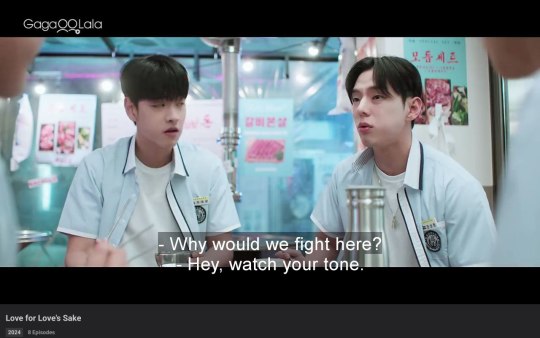

(Sangwon to Myungha)"Why would we fight here?"
(Yeowoon to Sangwon)"Hey, watch your tone (don't use informal speech)"
"Was I talking like that with you?"
"Talk curt (informally) only with me."
"I'm already being curt (talking informally) with you."
This one is definitely a cultural thing that always gets lost in translation (but "being curt" is a nice way of putting it). There are two general styles of speech in Korean: Formal (존댓말, jondemal) and Informal (반말, banmal). Of course, it's a lot more complicated in the language, but I'll paint briefly the differences that are pointed out in the scene.
I talked in previous posts about properly addressing your senior in korean (usually by title/position). To convey respect to your senior, you also use 요 (yo) at the end of the sentences – and both Sangwon and Yeowoon talk politely to Myungha. UNTIL Sangwon uses the rude version of a question, without polite ending ("Why would we fight here?"), to which Yeowoon protests and tells Sangwon that it's banmal, informal speech, and he should only use it with him.
Because with your friends, same age people (Yeowoon and Sangwon in this case) or people younger than you, it's normal to use their names with different intonations (Think Myungha's "Yeowoon-ah, Yeowoon-ie") and talk informally.
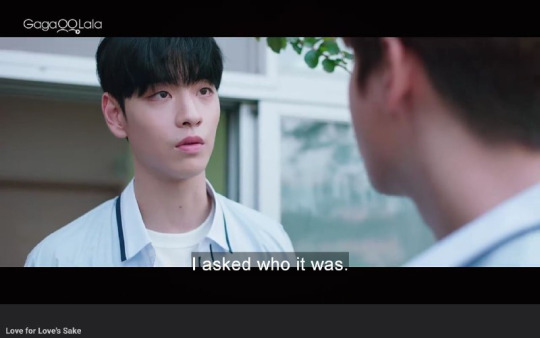

(Yeowoon to Myungha) "I asked who it was."
"You're being curt (that's an informal speech)".
Fast forward – Yeowoon loses patience and demands Myungha "I asked who it was", question without polite ending as well. To which Myungha cheekily says "that was an informal speech", reminding Yeowoon of his own remark to Sangwon.
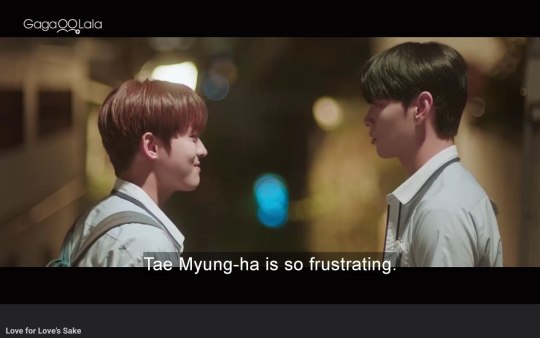

Fast forward again – and now I have to take back my previous statement from another post that Yeowoon never called Myungha by his name because I found the rare case of him doing it xD
"Tae Myungha is so frustrating."
"You're speaking informally more often these days."
Again, a youngster! calling his senior! by his own name! Not using the polite ending! The horrors of informal speech. He's not being too rude but he's sulking therefore he's rebelling. Though I can swear, again, Yeowoon hears Myungha's scolding and resorts back to speaking politely, and from now on, he'll keep using 'senior'.
If you survived until the end of this post, congratulations! The second half probably wasn't needed but in case you're learning Korean or you want to know why these seemingly normal phrases are being considered "curt" out of nowhere, I hope you understand it now a little bit better :)
// Previous messages translation + other language moments here //
#love for love's sake comments#watch me writing my own course Learning Korean with Kdramas on tumblr#but that fight dialogue scene was just perfect i couldn't resist#the exchange and usage of different terms was funny and the scene was hilarious on its own#sangwon and myungha are my heroes#love for love's sake#love for love's sake meta#bl meta#korean bl#korean drama#love supremacy zone#dropthemeta#korean language#linguistics#language
166 notes
·
View notes
Text
language, the building blocks of communication. how could i not want to learn it all?
ughhhh every script, every grammar structure, every word… i love it all so much.
the feeling of when you watch something you used to not understand? when you finally communicate your thoughts after struggling to get your words out? when you meet someone new? when you understand an untranslatable joke? when you learn one word then start seeing it everywhere? when your brain starts to hurt in the good way because its all so confusing? then months later down the line those things come to you like second nature… it’s incredible.
the human mind can do so so so much. why not learn it all? why not at least try?
even forgetting things, making mistakes, and getting embarrassed feels good at this point. it feels like it’s all part of the process.
:)
#language#language learning#langblr#studyblr#studyspo#languages#linguistics#there are so many things that are close to my heart but nothing touches it like language does#learn chinese#learn french#learn german#learn korean#learn spanish#study korean#polyglot
388 notes
·
View notes
Text
i think one really wierd aspect of learning a language with a totally different writing system is that you magically become six-years-old again. reading isnt immediate so you need to analyse every characers individually and then put the together to form an actual word in your head. its amazing, especially since now i automatically read some character so everything i find a text i feel like that leonardo di caprio meme
222 notes
·
View notes
Text
You can tag with your answers! I chose 11-13. Rebolg if you vote, I'm curious! :3
#Mine are English Spanish French German Welsh Portuguese Vietnamese Gaelic Dutch Arabic Polish and Korean.#polls#poll#linguistics#language
412 notes
·
View notes
Note
Do you think one could attain decent-ish ability to read Japanese just by studying kanji? Specifically asking because the kanji learnin' service "wanikani" is the single Japanese resource that works best with my brain, but then there are separate resources for grammar and vocab and and and.....
You will get REAAAALLLLLYYY far knowing only the kanji but you're going to have to know hiragana and katakana at some point too. Tofugu, the company that did Wanikani, has two mnemonics-based guides for the kana that are basically Wanikani Lite. They're how I learned the kana and I swear by them.
Here's hiragana: https://www.tofugu.com/japanese/learn-hiragana/
And katakana: https://www.tofugu.com/japanese/learn-katakana/
Hiragana are especially vital to learning kanji; you won't be able to use 99% of Japanese-English dictionaries without them. BUT they're pretty easy and the rules for using them are consistent. You won't have to remember any irregular exceptions for any of them.
I haven't tried it yet, but I've heard really good things about the Crystal Hunters manga series as a fun/low stress way to learning Japanese vocab and grammar. It eases the reader into new concepts and then repeats them throughout the chapter so you remember them. There are free vocab and study guides/lists for each chapter too. Might be worth checking out once you get some kanji and the kana under your belt? The first book is also free.
Official site: https://crystalhuntersmanga.com/
Good luck!!
#asks#Japanese takes like a bajillion hours forever to learn because of the 2200+ kanji lol...........#But it's sooooo consistent grammatically and with the spelling. I love it#Kinda spoiled me tbh. I look at English now and I'm like#'Why can't you be more like this. Why are you such a mess. Get your act together'#And then there's Korean's hangul writing system. It's SO BEAUTIFUL. Actual marvel of linguist engineering#The Japanese lexicon is also a lot smaller than English's too. Which is both a blessing and a curse#Less words = quicker to learn. BUUUUUTTTT less words that mesh well with English. Translation is hard!!!#Holy fuck. Ok so Wikipedia says that the English language has 755`865 words as recorded by Wiktionary#and Japanese has 500`000 according to Nihon Kokugo Daijiten#BUT THEN KOREAN. ACCORDING TO ONLINE DICTIONARY URIMALSAEM (open source dictionary) HAS 1`149`538 WORDS#The biggest lexicon is Tamil's with 1`516`952 unique headwords as recorded by online dictionary Sorkuvai#That's absolutely nuts#I got massively distracted. Enjoy my word vomit tags
37 notes
·
View notes
Text
Hi ! :D
I'm a first year french linguistics student and I made this blog to find other languages nerds like me, find interesting bits of data and infos about linguistics AND also compile said infos to motivate myself to study.
Languages I'm studying:
English (C1)
French (fluent)
Italian (B2)
Chinese (A1)
Korean (A2)
Dutch (A1)
i am also interested in Vietnamese, Thai, Esperanto and Corsican but for the sake of my ADHD it's only interest for now 😩
-> I'm a really curious person so please if you want to chat with me about languages or even better your (or of your) languages do so !
Anyways, welcome !
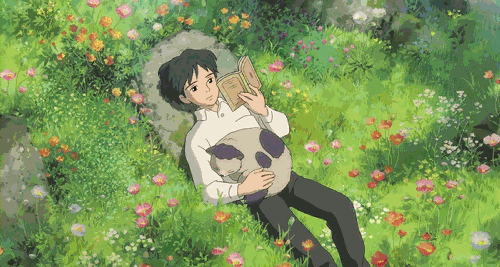
#french#studyblr#chinese learning#langblr#lingblr#linguistics major#linguistics#korean learning#korean#italian#language learning#language
24 notes
·
View notes
Text


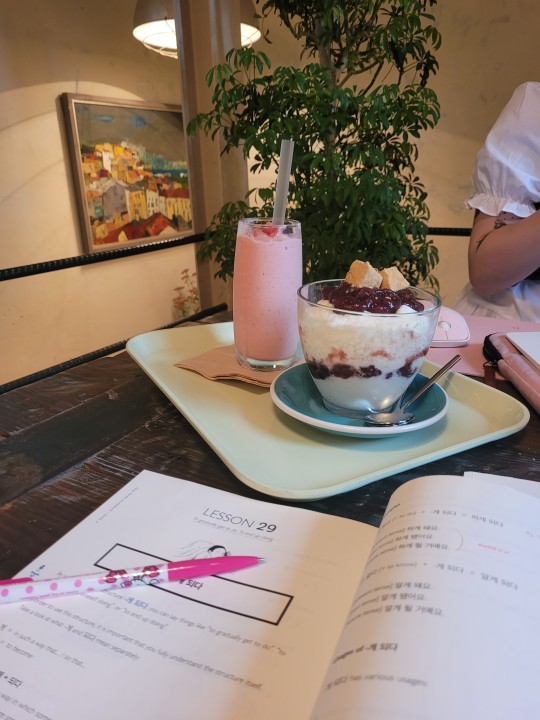

🌸06.18.23🌸
Hongdae café study day! We went to a few cafés before realising that a lot in this area have no studying rules on weekends 😭 ended up in the prettiest florist/ cafe hybrid eating some classic Red Bean Bingsu to avoid the 33°c heat 🥵
🎧 Change Up by SVT
📚 The Island of Missing Trees by Elif Shafak (164/52)
#studyblr#aesthetic#bujo#bookblr#books#studyspo#study#100 days of productivity#studying#langblr#korean language#korea travel#koreanlearning#korean langblr#linguistics
116 notes
·
View notes
Text
Studying Korean is aesthetic 🩷
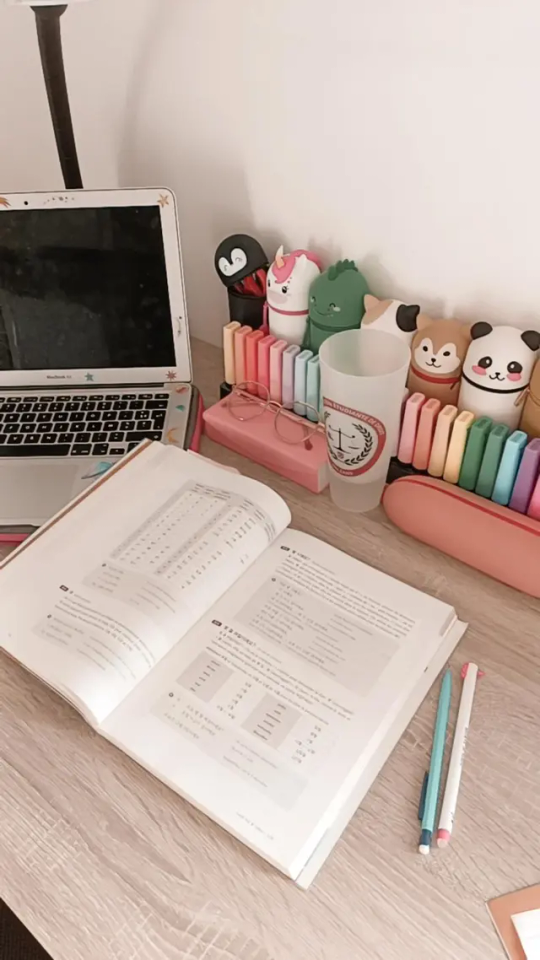

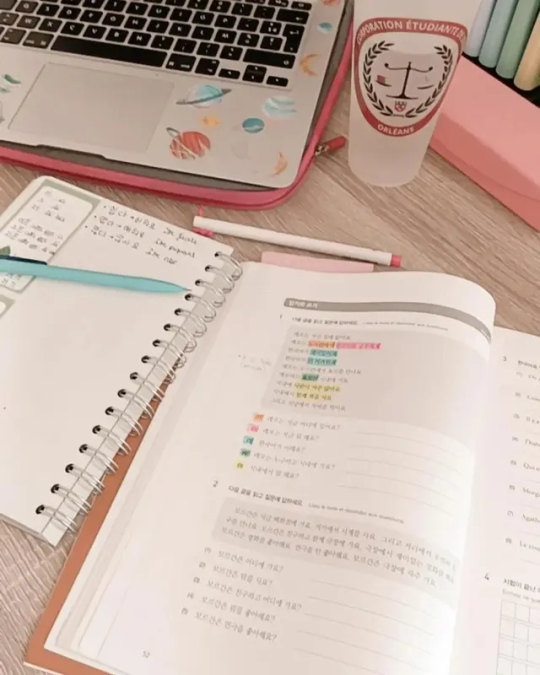
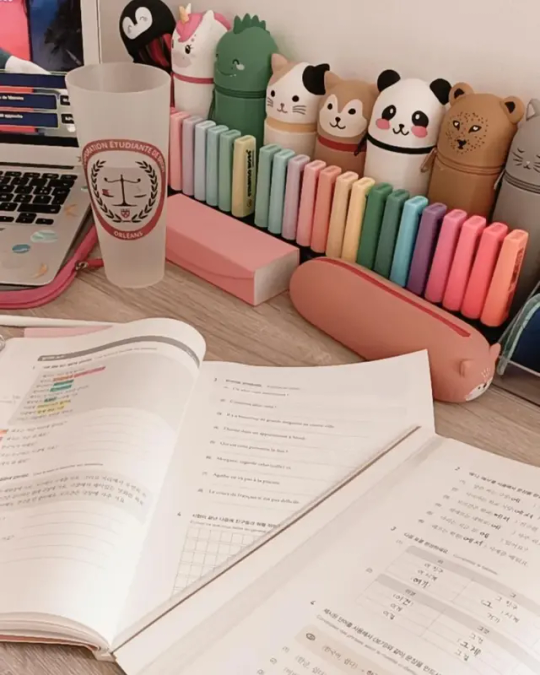
#academia#notes#study motivation#studying#studyblr#studyspo#linguistics#study space#korean#south korea#korean language#korean langblr#korean learning#korean lesson
55 notes
·
View notes
Text
think it’s super neat that koreans named this guy “yae” because that’s also the exact noise i make when i see a ladder

#korean#한글#korean langblr#korean language#한국어#langblr#language#language blog#languageblr#language meme#language memes#linguistics#linguistics humor#language learning#orthography#korean script
153 notes
·
View notes
Text
Korean Familial Terms Part 1
I've mentioned before that Korean has a very complicated and extensive system of familial terms (at least compared to English). So in this post I'll explain a bit more in depth of how these terms work!
Part 1: Immediate Family
부모(님) (bumo(nim)) - parents
Mother:
엄마 (eomma) - mom (informal)
어머니 (eomeoni) - mother (standard, formal)
어머님 (eomeonim) - mother (formal, used when referring to someone else's mother)
Father:
아빠 (appa) - dad (informal)
아버지 (abeoji) - father (standard, formal)
아버님 (abeonim) - father (formal, used when referring to someone else's father)
Sister:
누나 (nuna) - male to female
누님 (nunim) - male to female (formal)
언니 (eonni) - female to female
형님 (hyungnim) - female to female (formal): people very rarely know that "hyungnim" is actually a term that can be used by women as well in specific contexts. if you're a woman that's formally referring to an older woman then yes, you would use hyungnim. this is most common when referring to your sister in-law on the husband's side.
여동생 (yeodongsaeng) - younger sister
자매 (jamae) - sisters
Brother:
형 (hyung) - male to male
형님 (hyungnim) - male to male (formal)
오빠 (oppa) - female to male
오라버니 (orabeoni) - archaic version of oppa
오라버님 (orabeonim) - archaic version of oppa (formal)
남동생 (namdongsaeng) - younger brother
형제 (hyeongje) - brothers
Bonus
Cousin: you would use the same terms as sister and brother except you'll add the word 사촌 (sachon) in front of it when you need to specify that it's a cousin of yours.
Part 2: Grandparents, uncle/aunt, niece/nephew - coming soon!
Part 3: Father's side of the family, mother's side of the family, in-laws - coming soon!
#koreanlanguage#south korea#korean linguistics#korean#korean language#vocabulary#linguistics#kpop#kdrama
12 notes
·
View notes
Text
Asian Honorifics & BL - a quick & dirty guide, with examples
You ready for another one of my long broad brush linguistics in BL posts? (As always check the comments for people better than me correcting or adding content. Also I will be updating this post as long as Tumblr lets me fiddle with it.)
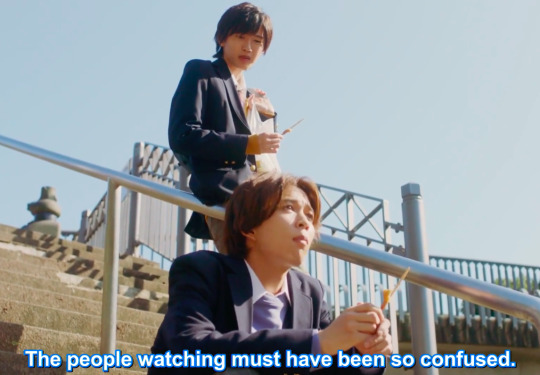
Codicil: I’m a dilettante who loves the cultural side of linguistics, and loves to help people understand BL better via language. I attempt to explain things using very simplistic terms and an anthropological approach, I am aware that it’s a lot more complicated. But I’m doing my best.
Codicil 2: This is meant to help BL watchers, not to guide tourists who in intend to travel to these countries.
Honorifics in General - the concept
Honorifics = a title or word implying or expressing status, politeness, or respect.
Many Asian languages employ honorifics in a filial manner (distinguishing status along generational lines with regards to birth year, professional relationship, and parental state). Basically calling someone who is NOT an actual blood relation “older brother” (e.g. Korean hyung or oppa) or “younger sibling” (e.g. Thai nong), or auntie (see many Indian or Latin American cultures). These can also be a kind of endearment in romantic relationships.
The closest most westerns can think of this is that the honorific is used as a way to delineate an intimate relationship/friendship across an age gap, but its implications are not always intimacy. (Except when they very much are, see oppa.)
You may be familiar with a phrases like “we’re so close she’s like my sister” or “he’s like a brother to me.”
However, because most westerners exist in relationships to peers only under the broad umbrella term friend, we will only use “like my sister” or “basically my brother” when someone is particularly dear to us but not sexually.
In most Asian languages, honorifics are more codified. So there is a status conferred by age which dictates honorifics be used. They’re mandatory for communication. Intimacy levels between individuals CAN impact this, but are not the primary decider on what honorific is used under most circumstances. Position in society is.
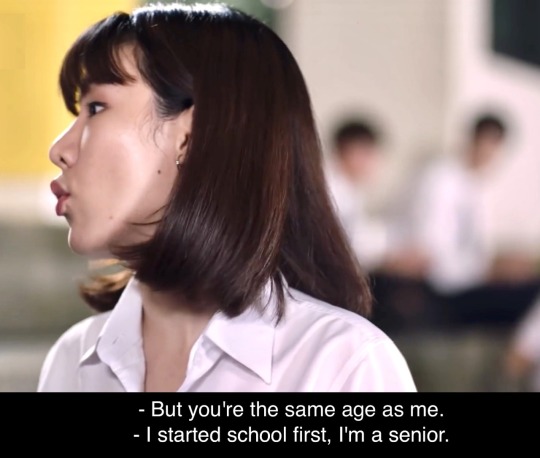
So these terms are often defined (or even translated) with sibling language. See early Thai BLs translate phi as bro, but that’s not strictly correct.
There are also often honorifics for larger age gaps (so more like auntie or uncle, delineating relationships like adult neighbors or a friend’s parents, or parents’ friends).
And there are honorifics for people in authority positions (like doctors, teachers, bosses) who are usually older (but not always). These honorifics are employed in the arenas of education, hobby activities (like ceramic classes or martial arts) and the workplace.
For many, informality of older to younger will be characterized by use of casual (or rude) language and lack of honorifics (from the older person to the younger one). So the older character will have one mode of address and way of talking, while the younger character exists in a more formal register when they are speaking back to someone older.
In other words, an older person can speak informally to a younger one, but not the reverse. (Yaja time excepted...)
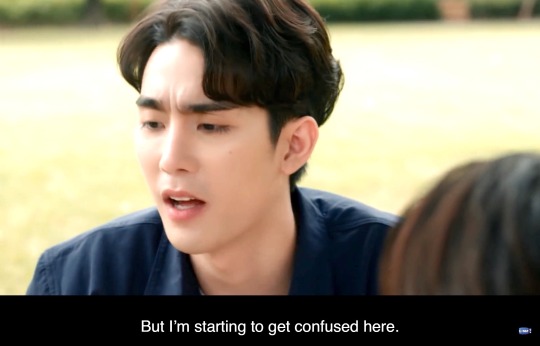
Complexity of Honorifics as Elements of Language
Honorifics can function as titles:
Honorifics can be translated as/like titles. This is is the kind of thing we are most familiar with: Mister, Mrs, Mz, Miss, Master, Mistress, Sir, Madam, Ma’am are all, technically, honorifics. So are certain forms of address and royal titles, “The honorable” for example. Anything you might put in front of a name to add formality in English probubly qualifies as an honorific.
Honorifics can function as pronouns:
Or modes of address. For example the title boss, in English can also be used to call or refer to someone directly. “Hi, boss!” or “my boss” or “the boss says.” Honorifics serve the same function. In this way they can become pronouns. You can, in Korean, just call someone “hyung” it acts as the you pronoun for direct address. And often they can also be used in the 3rd person. So my “hyung” did such and such. This is why hyung = brother in a lot of translations. Because English uses brother in much the same way, it can act as both a 2nd or 3rd person pronoun. (Rarely first, but that’s an issue with English, that our first person pronoun is so inflexible.)
In Thai you can refer to a friend as phi (you pronoun in direct address, or use it as a she/he/they pronoun in third person) or you may refer to yourself as phi (using it as an I pronoun). In other words, phi can entirely replace a person’s name in all linguistic uses.
He/She/They goes to the store = phi goes to the store (when talking about my older friend to someone else)
I go to the store = phi go to the store (when talking to a younger person about my own actions), and
you go to the store = phi go to the sore (when talking to an older friend about something they are going to do - direct address)
Honorifics are also suffixes:
In Korean and Japanese honorifics are also attached to names in the form of suffixes. See the Japanese section. (Also sometimes prefixes, argh.)
Honoring is also attached to particles:
In Thai, polite particles confer respect levels as well, which means they also contain within them certain aspects of status and honorifics. See the Thai section.
The best way to understand honorifics in BL is by example.
Ready?

Korean - Honorific titles: Hyung, Noona, Oppa & Beyond
I’m starting with Korean because it is the most spoken and understood by westerners these days. I can only address this as a layperson who watches too many Kdramas.
Korean names in brief:
In Korea names are said family name first (what we call surname or last name) and then given name second (what we would call first name). Usually the family name is single barreled or one syllable, but the given name is double barreled or two syllables. So: Chu Sang Woo = Chu (family name) Sang Woo (given name, always said together). This is why I will usually refer to BL characters by their first name as a combo, e.g. SangWoo. In formal address, however is would be Chu SangWoo-ssi. Usually the entire name is said (see comments). Even when JaeYoung is being rude he usually says “Chu SangWoo.”
Korean honorifics you’ll hear:
Hyung | hyeong 형 - is said by a younger male when addressing an older male. I will use the term Hyung Romances for BLs that feature a younger seme pursing and older uke because...
Noona | nuna 누나 - is said by a younger male when addressing an older female and is responsible for the accepted series category “Noona romances” which are dramas that feature a younger boy pursuing an older woman.
Oppa 오빠 - is said by a younger female when addressing an older male. Also used by girlfriends addressing their boyfriends, or wanna-be boyfriends. Under a romantic context oppa is considered somewhat cringe/cheesy/cutsie.
Unni | eonni 언니 - is said by a younger female when addressing an older female.
Sunbae | seonbae 선배 - is said by a younger person to an older person (gender neutral) and is more formal. It can be used in the workplace and it mostly about seniority and less familial.
Hoobae | hubae 후배 - is said to/of a younger person, either across a generational gap, or within a workspace environment, again this one is about seniority and less familial.*
Although an older person’s filial and social responsibility to a youngster is always in play.
In Kpop you’ll hear sunbae used a lot by younger (say 4th gen) groups when referring to older groups within the industry. Or when talking about Kpop idols who they don’t personally know (or are so big they’re nervous about any assumption of intimacy). On reality shows like Queendom or Kingdom it’s particularly telling. Some of the funniest moments of Kingdom Legendary Wars is any time Penal (an American from BTOB - an older v established group) tries to convince the youngsters, some of them 10 years his juniors, to use casual language (drop honorifics). The poor things get SO confused.
BL Deeper Meanings behind Hyung
Okay so the best show to watch for this one is Semantic Error.

SangWoo starts out calling JaeYoung sunbae and rarely goes less formal. Technically sunbae is polite, but also slightly insulting in a university narrative of this type. Let me try to explain. Because as they become more intimate, combative or not, friends or frenemies, SangWoo should switch to using hyung, but he pointedly does NOT.
JaeYoung, on the other hand, always uses extremely informal (to the point of rude) language with SangWoo. (Culturally, he allowed such informality as he is SangWoo’s senior both at university, and in age). But you can watch him get annoyed that SangWoo insists on sticking to sunbae, to the point where he demands SangWoo use hyung.
Then after that, anytime SangWoo does use hyung JaeYoung totally melts for it, because it was hard fought and won, and it means something powerful and significant is shifting in their intimacy as a result.

During the mutual kissing at the bar scene, Semantic Error drops yaja time on us. Yaja time is a sanctified reversal of honorifics that essentially allows for a younger person to speak their mind informally and without repercussions (or supposedly so). It’s a kind of way to flirt and tease, but also somewhat taboo and titillating as a game to play when tipsy. You get yaja time in bars/clubs sometimes, like happy hour. If you watch the final episode of Kpop reality show I-land you’ll see a real word example of yaja time in action amongst the contestants, it’s adorable and very funny.
Semantic Error uses yaja time as an opportunity for drunk SangWoo to finally talk about his real feelings, without the pressure of linguistic formality.
They also use it for JaeYoung to drop the sluttiest most flirtatious hyungs in the history of all hyunging. Seriously, the boy is dripping seduction with that one world. Why? Because HE CAN. He is making the formality itself a kind of kink.

You can watch these two on the promo circuit attempt yaja time and even though they have an easy brotherly relationship, you can still see how uncomfortable it makes Jae Chan in particular.
Other honorific play in Semantic Error:
The girl who is interested in dating SangWoo calls him oppa, and ALSO requests to use a nickname+oppa with him (the nickname means lettuce). That is pretty blatant flirting. But note she specifically asks if she is allowed to do so?
Later when JaeYoung confronts her and stakes his claim, notice the thing he really wants corrected is her language with SangWoo? He wants her to go all the way beyond sunbae to formality by using the honorific suffix 씨 (ssi). But there’s also more lettuce wordplay here (I think) because he isn’t insisting she use SangWoo’s full name.
“You should call him Chu-ssi” which is translated into English as “Mr Chu.”

A word on oppa and queerness.
Because the implication is that the person saying oppa is female, you will rarely hear boys use this term for their boyfriends (even if they are out gay, unless they are femme and/or cultivating the association for a very specific and culturally subversive of kinky reason).
Exception: non native speakers who are happy to fart around with us and the Korean social structure. So early on, NCT’s (Kpop monster group) Mark (Canadian) would refer to Yuta (Japanese) as oppa. I’m not gonna unpack their relationship, but trust me when I say, no native Korean idol would have ever done this, not right now in Korea’s current social state. Well... maybe Holland but that’s a whole other discussion.
To complicate matters Korean also uses honorific suffixes, but I’m not gonna go into them here. (Read more about Korean honorifics.)
Instead I’m gonna use Japanese to talk honorific suffixes. Ready?
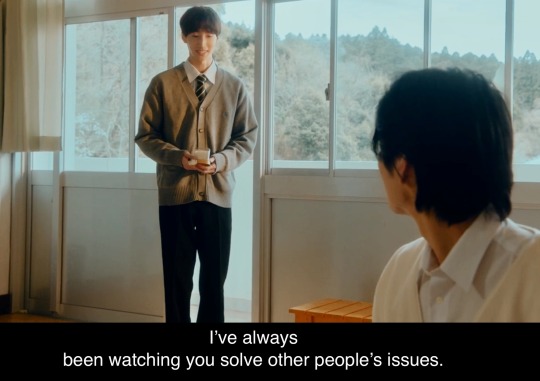
Japanese - Names & Honorifics: suffixes & titles
Like Korean, Japanese uses both suffixes and title honorifics. But I find the suffixes much easier to hear in Japanese than Korean, probubly because I’ve more experience with the language.
Note: As a foreigner in Japan I’ve alway found it best/easiest to refer to someone using surname-san.
Japanese names in brief:
Names are said family name first and then given name. But actually, given names are rarely, if ever, said AT ALL (after an initial introduction).
In BL dramas almost all character’s names and everyday use name will be the family name. (Children are different, but not many of those in JBL.) Teachers may refer to their students by given name-kun.
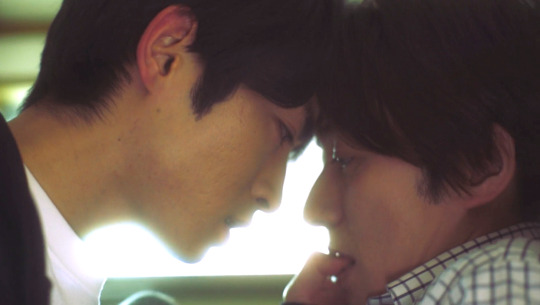
So in Old Fashion Cupcake Togawa is his family name (not given name). Nozue (also a surname) who is both older and Togawa’s boss, refers to Togawa simply as Togawa, with no honorifics, probubly because they are both adult characters and have been coworkers for so long, Togawa-kun would be... odd.
Togawa on the other hand, ALWAYS refers to Nozue as Nozue-san. Even in times of EXTREME intimacy the honorific -san is ALWAYS used.
We have no idea what the given names are for these characters because we never got to that point of intimacy in their relationship. In Japanese romances the given name is usually the ultimate intimacy and is not exchanged until well into a relationship, sometimes after sex or even after marriage. You can watch the delicate maneuvering around this aspect of intimacy in the kinky het drama Sweat & Soap (it’s not BL, but I still love it, on Viki.)
Japanese Suffixes you hear the most in BL:
-chan = is intimate and cute for children, or amongst female friends, or female family/intimates (like your grandma)
-kun = is for respected juniors, younger or junior co-workers, or young boys, and amongst friends
-san = is formal/polite and for general use, amongst friends, equals, strangers, and acquaintances
The best BL to watch to hear all three of these in constant use is Minato’s Laundromat.

Shin always calls Minato, Minato-san and gets very annoyed when anyone doesn’t do this who should (he want’s his man properly respected). Note that he puts Minato-san into his phone as Akira, tho... daring boy.
Asuka calls Minato: Akira-san, which he shouldn’t as a kid a generation younger than Minato. He gets away with it because he and Minato are from the same neighborhood and have similar open, friendly natures.
Minato, on the other hand, struggles with what to call Shin. Technically he should use Katsuki-kun or even Katsuki-chan (which is what he uses on Shin’s sister). Which is Shin’s surname + the suffix for a junior. But Minato is a causal person, so he never bothered with a suffix even at first. Now, informal language is fine from an older person to a younger one, if they have the right personality. But under BL circumstances, Minato’s lack of honorifics kind of gave Shin license to flirt. The moment Minato asked if he could use the nickname Shin he was a goner.
As Shin becomes more aggressive in his pursuit, Minato hops desperately between different suffixes to try to control the situation:
Shin (informal and friendly),
Shin-chan (diminutive, under this context = somewhat demeaning, considering what Shin wants from him), Minato is intentionally lowering Shin’s status and emphasizing his youth when he applies -chan,
Shin-kun (when he thinks Shin is mad at him, or in public, or when he is annoyed and wants to add formality and distance)
I talk quite a bit about this in my squee watch of this series.
Putting someone who should be (or is usually) address by one combo of name (first or last) + suffix into another, by changing either the name of the suffix or both, always has narrative significance for character development or plot or both in Japanese romances. Which is why you get more from the story if you train your ear to listen for these.

In the picture above, Takara is using -san for sarcasm and to gently chide Amagi. Usually he just uses Amagi with no honorific (they are the same age, and he is a curt characters) or Amagi-kun in public of for call/response address. He has moved to a higher level of formality for emphasis and to make a point in this scene. Communicating properly and avoiding conflict is a hallmark of his character, also (as the seme) he wants to control Amagi. This is all wrapped up in that personality and attitude. He is being teasing and sarcastic, but he is also stressing that this dialogue is important to him.
Read more on Japanese honorific suffixes here.
Japanese honorific titles you hear the most in BL:
Senpai (先輩、せんぱい) - senior colleague or classmate, roughly equivalent to the Korean sunbae or Thai phi
Sensei (先生、せんせい) - refers to teachers as well as people who are experts in their respective fields, like doctors, artists, professors, martial arts instructors, or lawyers
The best BL to watch for use of honorific titles in Japanese is... bet you thought I wasn’t gonna manage to shoehorn it in.... Seven Days!
*insert wild cheering*
Sereyo (younger) seems to relish and very much enjoy and flirt by using the honorific senpai with Yuzuru. It’s hard to explain, but the way Sereyo says "senpai” whenever they meet is very very... cute.
You can hear these characters use sensei when in archery practice. And you can hear use of some family suffixes and honorifics since we follow both characters back to their respective homes.

Sereyo calls Yuzuru, Yuzuru-san, which is Yuzuru’s GIVEN NAME + the honorific. This is unexpected because Yuzuru is his senior. He should call him by his surname + honorific: Shino-san.
But Sereyo has an issue, which is that Yuzuru has the same last name as his ex-girlfriend, who was also older. So in his previous relationship, Sereyo called his lover: Shino-san, and he doesn’t want to use the same exact name with his new lover, Yuzuru. So despite Yuzuru being his senior, he asks to use Yuzuru’s first name as a mode of address. Yuzuru being the kind of casual blunt personality he is, doesn’t mind the inherent informality and permits this right away.
More on Japanese honorifics here.
Mandarin Chinese Honorifics

Ho boy am I not going to climb into this one. But I will point out that to confuse matters many Chinese honorifics are actually also blood relation titles - 哥 ge (older brother) 弟 di (younger brother) - (like phi/nong, par/ar, hia/jay in Thai). In other words, the honorific actually is both brother (honorable title) and brother (actual word) AND will be applied to cousins. As in: the word for cousin is ALSO the same word as brother.
In Thai to clear up this relationship a character will often have to state it blatantly: "my real actual older bother, by blood, and not an older male friend” (since phi means both) and not a lover. See this grappled with as a jealously plot point in Star in My Mind.
But in some Chinese BLs they will also have to explain and distinguish actual blood relationships as different between cousins and siblings. You can watch Addicted deal with these nuances.
It should be noted for the BL crowd that Mainland Mandarin and Taiwanese Mandarin are ALSO different. So there are language nuances to Taiwanese BL that do not exist in Mainland BL (when it was around) and vice versa. And because Taiwan recognizes equal rights, there is also a whole adapted Chinese linguistic set around queerness.
I’m mentioning Chinese in this post mainly because it will come into play with Thai honorifics: hia & jie/jay 姐. Personally I struggle to even distinguish names let alone honorifics, I find Mandarin a particularly difficult language.
Thai - Honorifics, Pronouns, Particles & beyond phi/nong

I have quite a bit on Thai honorifics and their complexity plus how it relates to BL.
Thai Honorifics Between Ages in BL and real life
More on Thai Linguistic Registers - Particles & Honorifics
Thai Pronouns & Honorifics when Seme/Uke is Flipped
Sarcastic use of honorifics & polite particles in Thai
Linguistic Fun In Thai BL - couples
The Nu Diminutive in Thai
Touch & Daisy in Secret Crush On You - Queer Coded Language and 3rd Gender Identity
The most important thing to know, and how it’s different from Korean, is that phi & nong are gender neutral.
Also honorifics and politeness in Thai plays into both pronoun use and polite particles. Thailand does not have honorific suffixes like Japan or Korea, instead particles (which are kind of like spoken punctuation) come into play.
It’s complicated, in that there are a lots of ways to indicate relationships in Thai. But less complicated in that, at heart, gender doesn’t impact it as much as in Korean or Vietnamese. Instead, like Japanese’s -san, you can default to formal register by remembering to use khun (+ polite particles).
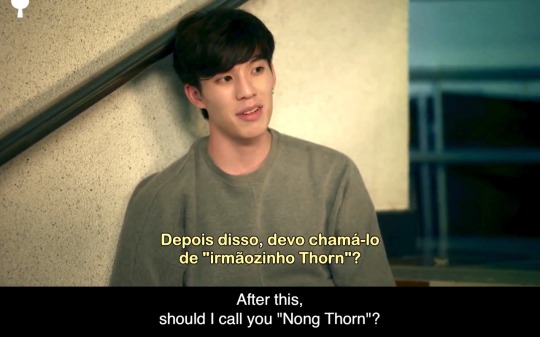
Loosely?
Phi = hyung, noona, unni, oppa, sunbae, or senpai, and its gender neutral.
Nong = hoobae or -kun or -chan, but is rarely used in direct address. Instead, informality in Thai is characterized by use of casual (or rude) language and lack of honorifics (from the older person to the younger one) + rude or informal particles. Nong is also gender neutral and can be used as you pronoun (rarely as I), or as a third person pronoun to refer to pets, or as a diminutive attached to a name, it’s... complicated.
Actually episode 10 of Love Mechanics plays with this. Vee whispers in Mark’s ear the equivalent to “Phi’Vee loves cute nong Masa.” Masa is Mark’s given name and it is Japanese because Mark is half Japanese.
But then, to tease him, Vee lowers his voice (Japanese men speak from low in the chest) and says: Masa-kun. Kind of the Japanese rephrase of the above.
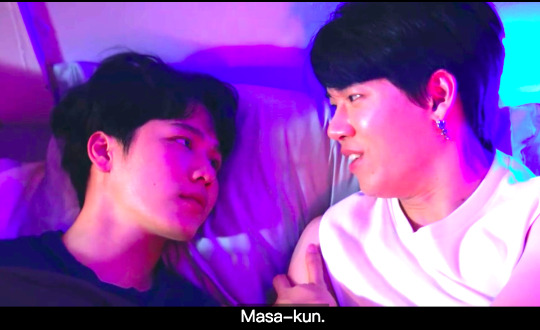
Hia = hyung/oppa (it may be used by a younger male or female but is only use on an older male) and specifically ties to Chinese heritage.
Jie/jay = noona/unni (it may be used by a younger male or female but is only use on an older female) and specifically ties Chinese heritage. It has also been coopted by the queer community and may be translated as “sis” under those circumstances. More about hia here.
Khun = -ssi or -san, and is a gender neutral formal address. It can be a title Khun + Name (first or last), an I/you pronoun, and also a proper name (ya, know, just for s&gs). Also in families that are more formal it is a mode of polite address for parents, Khun Maa for mother, Khun Paa for father.
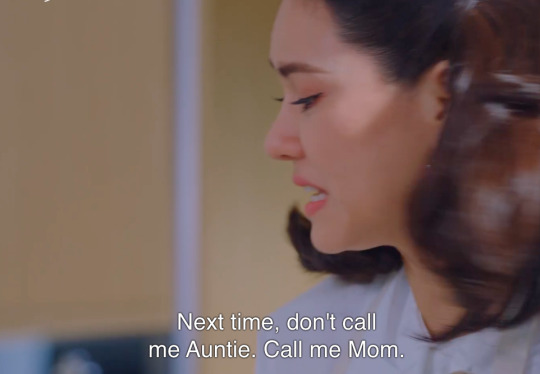
Vietnamese Honorifics
Vietnamese honorifics and modes of address are not my bailiwick but the amazing @squeakygeeky has been blogging a series around VBL linguistics and it’s queer struggles with pronouns because of bifurcation around gender.
Oh boy was this a lot. And I am sorry to @timelesstoothfairy who originally asked this question, I don’t think they realized what a can of worms it opened up.
Language, how is it SO MUCH FUN?
(source)
#BL language#bl linguistics#thai language#thai linguistics#asian honorifics#linguistic registers#honorifics#korean language#korean honorifics#japanese language#japanese honorifics#thai bl#japanese bl#korean bl#thai pronouns#thai particles#polite particles#Thai Honorifics#Thai Linguistic Registers#Linguistic Fun#chinese bl#addicted bl#addicted heroin#addicted the series#Star in My Mind#Japanese suffixes#seven days the series#Japanese honorific titles#Japanese honorific suffixes#ShinMinato
476 notes
·
View notes
Text

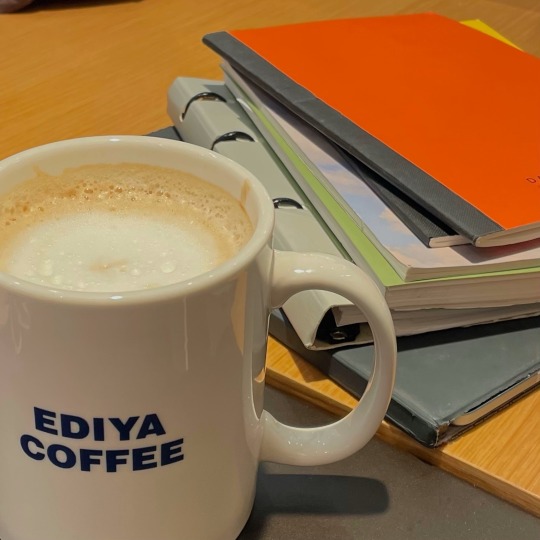
am i a coffee addict? absolutely.
finishing summaries of 2 Korean articles is a goal for today. it’s a homework for our political translation course. writing summaries is time-consuming as you need to comprehend the text in Korean, which is difficult. such kind of articles are full of new words we’re supposed to learn by heart.
so, there’s pattern that works for me:
1. finding new words and their definition
2. translation of the paragraphs, one by one
3. highlighting the main ideas in each paragraph and quotes that can’t be omitted
4. putting all the highlighted parts together, using necessary grammar
boom, you’re cool because you have done the assignment and practiced translating🤝🏻
#exchange student#korea#student life#studying#language#university#university life#studyblr#translation#linguistics#university aesthetic#university studyspo#university student#study blog#foreign languages#tips for students#coffee#korean cafe#cafe aesthetic#cafe#study motivation#student#university struggles#university studyblr#studyspo#study aesthetic#light acadamia aesthetic#light academia#korean language
28 notes
·
View notes
Text
very very curious to ask, langblr
what is your definition of "fluency"? at what point do you say you can “speak" a language?
no right or wrong answers of course, im just curious to see what others think
#langblr#languages#polyglot#studyspo#language#language learning#learn korean#learn chinese#learn french#learn german#learn spanish#studyblr#study korean#study blog#linguistics#language stuff
137 notes
·
View notes
Text
(BlackPink) In Your Area! / ~세권
One phrase that you may not come across unless you live in Korea is ~세권. The most common term used with this is 역세권. It’s hard to directly translate this, but roughly means “Near a train station” - generally within a 5-10 minute range.
Ex:
“역세권 아파트다 트리플 역세권이다”
“It’s an apartment with stations in the neighborhood. It’s a triple station area”
Let’s break this down:
역 (驛) - (Train / subway) station
세 (勢) - Influence
권 (圈) - Range, Radius
Directly translated it’d be something like “The influence / strength of being in range of a station” So having a “역세권 아파트” is a positive feature for your apartment. This also can be used for other convenient or positive places within a neighborhood.
스세권 (스 = 스타벅스) - Starbucks in the neighborhood
편세권 (편 = 편의점) - Convenience store in the neighborhood
슬세권 (슬 = 슬리퍼) - Being close enough to a good place (like cafe or 맛집) that you could wear your slippers
Example:
“와 동네 진짜 좋네~ 역세권인데 또 스세권인 아파트네!”
“Wow, this neighborhood is really great~ It’s not only close to the station, but also right near a Starbucks too”
For fun try thinking about what kind of area of influence your apartment or house has.
#korean#한국어#studyblr#한국어 공부#한국어배우기#study korean#learning korean#learn korean#korean language#korean slang#slang#linguistics#korea#south korea#kpop#studying korean#study#studying
22 notes
·
View notes